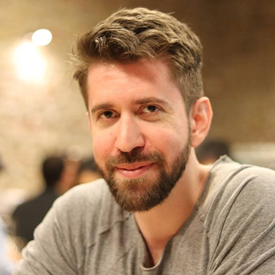
Guilherme Lanna
Country Of Origin: Brazil
Degree: Full-time MBA, 2018
Cloud Product Manager, Arrow ECS EMEA
As with the majority of computer engineers, my first job was as software developer. Looking for something less technical, I decided to venture into the business world and joined PwC working with business consulting in projects for various industries like telecommunications, FMCG, and construction. Finally, I joined Claro, one of the largest ICTs in Latin America, and found happiness by realising that working as a product manager in a tech company I could bring together both my technical and business interests.
As with the majority of computer engineers, my first job was as software developer. Looking for something less technical, I decided to venture into the business world and joined PwC working with business consulting in projects for various industries like telecommunications, FMCG, and construction. Finally, I joined Claro, one of the largest ICTs in Latin America, and found happiness by realising that working as a product manager in a tech company I could bring together both my technical and business interests.
In my last role I had been given high degree of freedom to try different approaches and methods to create and further develop products. However, this also imbued my tasks with a high degree of complexity and risk. Because of that, I found myself constantly studying after hours trying to learn various skills related to marketing, finance, operations and strategy, amongst others.
I felt that to be a good product manager and to thrive in the tech world I needed to be an expert in both technology and business subjects. Having graduated from a top computer engineering school, UNICAMP, I already had a good technical academic background, but felt I still needed to develop my business skillset much further, and that was when I decided to do an MBA. Talking to one of my former bosses who became my mentor, we agreed that I should look for a world class MBA, not being restricted by the universities in my home country, Brazil.
I started looking through the global MBA rankings and universities’ league tables, then read through the programme descriptions. I also considered the university culture itself, as I didn’t want a programme that emphasized the mentality of making profit above all things. When the time came to finally assess my options, I was very careful with marketing strategies from universities that overcharge students for a brand in their CV instead of a fruitful learning experience. In the end I shortlisted the Lancaster MBA because it had an interesting approach to management that brings back learning from ancient philosophers, delivering to its students more than just a skill set, but a whole mindset for management.
In fact, the whole MBA journey was quite interesting. It is, mostly, set apart from big urban centres giving a higher level of immersion, which the programme explores well by making its students constantly reflect on learning experiences, lived prior and during the MBA, aiming to develop self-awareness, teamwork, and critical thinking. This approach was used for most of the course modules, but we also had two, ‘core capabilities’ and ‘mindful manager’, that were designed specifically to develop these soft skills.
Of course, we also had the expected modules of marketing, finance, economics, operations management, strategy, leadership, international business, ethics, digital innovation, entrepreneurship, and human resources. From those, my favourites were in strategy (‘strategic management’, ‘corporate strategy’, ‘managing strategic change’, and ‘strategic brand management’). They covered a wide range of the strategy subject but with considerable depth, and the delivery method was a mixture of formal lectures and development of business cases in practice, making it an effective and pleasant learning experience.
In the end, the Lancaster MBA made me realise that a great MBA is much more than a course, it is fulfilment of the mind; a personal and professional transformation journey that, through theory and practice, helped me better understand the business world in all its uncertainties and paradoxes, giving me much more confidence to engage with opportunities and face challenges to further develop my career, even beyond my country’s boundaries.

